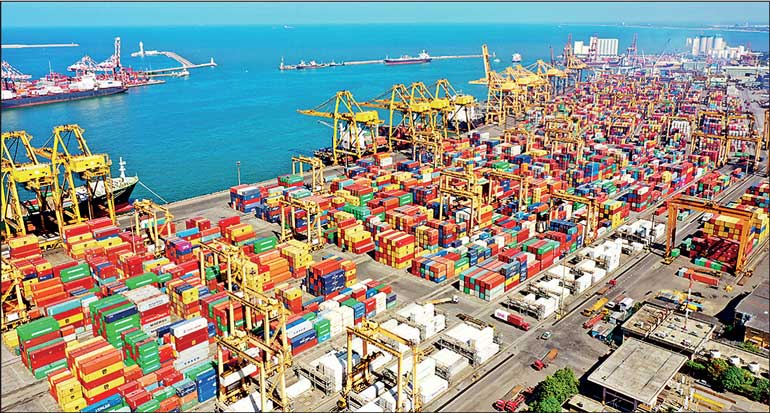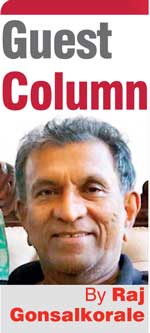Friday Feb 20, 2026
Friday Feb 20, 2026
Saturday, 13 May 2023 00:00 - - {{hitsCtrl.values.hits}}
 The negative effects of the open economy continued to be felt as succeeding governments chose the open economy path rather than giving an impetus to local industrialists to improve their industries
The negative effects of the open economy continued to be felt as succeeding governments chose the open economy path rather than giving an impetus to local industrialists to improve their industries
Opening the economy per se was not the sole issue. But, doing so without an economic and social analysis of the impact on many industries, industrialists and those employed in the industry directly or indirectly, and an assessment of the long-term effect on what should be imported and what should be made locally was the issue. It is disheartening to hear some leaders saying even today that opening the economy was a significant achievement, rather than talking about its weaknesses as it tends to demonstrate the country has not learnt from its past mistakes in introducing policies without any thought given to the long-term effects of such policies
 An Eastern analogue is found in the Suvannahamsa Jataka, which appears in the fourth section of the Buddhist book of monastic discipline (Vinaya). In this the father of a poor family is reborn as a swan with golden feathers and invites them to pluck and sell a single feather from his wings to support themselves, returning occasionally to allow them another. The greedy mother of the family eventually plucks all the feathers at once, but they then turn to ordinary feathers; when the swan recovers its feathers, they too are no longer gold – Wikipedia
An Eastern analogue is found in the Suvannahamsa Jataka, which appears in the fourth section of the Buddhist book of monastic discipline (Vinaya). In this the father of a poor family is reborn as a swan with golden feathers and invites them to pluck and sell a single feather from his wings to support themselves, returning occasionally to allow them another. The greedy mother of the family eventually plucks all the feathers at once, but they then turn to ordinary feathers; when the swan recovers its feathers, they too are no longer gold – Wikipedia
The above analogue may be interpreted to describe the open economy policy introduced in 1977 as a misguided, short-term fix to address a situation that prevailed at the time where some hardships were being experienced by the population due to import restrictions and the local industrialisation policy prior to 1977. These hardships could have been temporary if the policy and practice were improved where improvements were required rather than abandoning it or causing it to be abandoned as a consequence of the easy, quick fix. A nation of traders rather than industrialists was the consequence of the open economic policy.
The regime that came to power in 1977 had two major failings amongst some positive development initiatives. Introducing a no holds barred open economy was one of them. Not pursuing a reconciliation path to nip the evolving armed struggle of the Tamil militants was the other.
The introduction of the local industrial development strategy of the previous regime was stopped on its tracks and the stable doors were opened fully to allow imports of virtually everything from pins, match sticks, to more complex engineering goods. Many industrialists, large and small became traders and the nation lost many of its industries and the evolving industrialisation focus. Although not perfect, the local production of many items that had been imported hitherto had set the country on an import substitution path and had given opportunities for entrepreneurs to embark on new ventures.
The negative effects of the open economy continued to be felt as succeeding governments chose the open economy path rather than giving an impetus to local industrialists to improve their industries. One could say that the economic debacle being experienced today has its foundations in the 1977 decision to open the economy without any thought given to the future of import substitution industries considering the country has been dependent on imports since the advent of the open economy and the current debacle occurred as the country had no money to import even some essentials.
Opening the economy per se was not the sole issue. But, doing so without an economic and social analysis of the impact on many industries, industrialists and those employed in the industry directly or indirectly, and an assessment of the long-term effect on what should be imported and what should be made locally was the issue. It is disheartening to hear some leaders saying even today that opening the economy was a significant achievement, rather than talking about its weaknesses as it tends to demonstrate the country has not learnt from its past mistakes in introducing policies without any thought given to the long-term effects of such policies.
The blow inflicted on the local industry, particularly the import substitution industry, was not addressed and is yet to be addressed. The country is yet to see a policy on local industrialisation and how inputs for it including technical education, incentives to promote quality improvements, and mechanisms to identify and promote the potential for exports of finished products and/or components for finished products being made elsewhere.
Import restriction forced on the country due to the economic debacle has given some thought to import substitution industries. This however is not strategic thinking but rather on the hop circumstantial thinking as had been done in the past. It is more than likely that an avalanche of imports would commence if the country had the money to do so, smothering the local industrialists who may have been misguided by a belief that opportunities they thought were there, and commenced some industries.
The 1977 regime also had a great opportunity to introduce policies and mechanisms to foster a better understanding amongst all communities in the country, especially amongst the Sinhala and Tamil communities. Its inaction led to consequences that the country is very familiar with. No doubt there were sensitive political issues and stakeholder resistance to avenues for compromise on individual positions. Perhaps, looking at the issue from a humanitarian point of view rather than a political or historical point of view, both closely interlinked, may have been the stumbling block. More than 40 years later, there is no significant advancement on stakeholder positions as politics still seem to define the path to a solution.
The challenge now is to look at the present rather than the past and look towards the future of the current younger generation and generations to come. Very few of the younger generation seems to have confidence in Sri Lanka and any faith on a future for them in the country judging by the numbers who have left the country last year and who are likely to leave the country given a chance to do so. Politicians of today do not inspire any confidence in the younger generation and more of the same is the last thing they would wish for. But, that seems to be what they are in for judging by the politicians’ inability to think of the country before them and their welfare.
However, could one lose hope as without hope there is no light at the end of the tunnel? Despite individual reservations, the President appears to be genuinely attempting to chart a new course for the country. As with all politicians, people do have scepticism about the President as a politician. There would have been less of this had the Opposition parties buried their hatchet and with it, at least for the time being, their politics, and agreed on a medium term (at least 3-5 years) program of economic and social governance, and even better, a national government where every party takes equal responsibility for the governance.
In order to generate the badly needed confidence in the minds of the younger generations, besides an agreement on an economic and social governance compact or a national government, a new political governance system needs to be introduced to replace the current system at the end of the 3–5-year period. If the same system producing the same calibre of politicians were to resume the same type of politics, the younger generations, who are certainly not insane, could well echo what Einstein said, quote “Insanity Is doing the same thing over and over again expecting different results” end quote.
The ball is therefore well and truly in the court of the politicians to rise above partisan politics and discuss ways and means of agreeing on an economic and social governance model. In such a model, there can only be a President and a small cabinet of ministers and perhaps some State ministers for specific subjects to assist the cabinet ministers, but not a Prime Minister nor a Leader of the Opposition. Both positions are irrelevant, unnecessary, and counterproductive to a unity model. Will the politicians have the guts to contemplate a model of this nature? Perhaps not.
In regard to a futuristic governance model, readers are referred to an article the author wrote, and which was published including in the Daily FT titled “Contours for a new constitution with a difference, for the future, not the past” (https://www.ft.lk/columns/Contours-for-a-new-constitution-with-a-difference-for-the-future-not-the-past/4-723830). This model was submitted in order to generate a discussion on what might be different to what the country has had for 75 years. Basically, it proposed the direct involvement of non-political experts in different fields of expertise in policy development and monitoring, a differentiation of political devolution and administrative devolution, political devolution to grass roots by strengthening the structure and role of local government so that the social compact between the people and the politicians will be stronger, the establishment of regional councils and the introduction of an electoral college to elect members of regional councils and even the national Parliament.
There is no evidence that the country has learnt from past mistakes. Successive governments have not continued the positive policies of past governments, with improvements where they were necessary. The import substitution industrialisation policy was one of them, with the open economy policy smothering it to nonexistence. There have been other major development projects begun by one set of politicians and abandoned or scaled down by others without proper assessments. Abandoning of the LLRC report implementation process, the Missing persons investigation and report presented by the Paranagama commission are just two others amongst many initiatives taken by one lot and abandoned by others purely for political reasons.
We can learn a lot from our mistakes if we have the guts and the courage to admit them and learn something positive from it. Your worst mistakes are your best teacher, making you better than before. The only real mistake is the one from which we learn nothing, and the successful man will profit from his mistakes and try again in a different way – azquotes